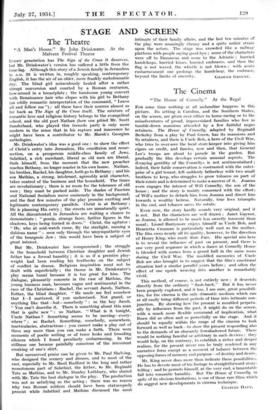The Cinema
"The House of Connelly." At the Regal FOR some time nothing at all unfamiliar happens in this picture. Its setting is Carolina, and the Southern States, on the screen, are given over either to horse-racing or to the misadventures of proud, impoverished families who live in tumble-down mansions attended by a few faithful negro retainers. The House of Connelly, adapted by Reginald Berkeley from a play by Paul Green, has its mansions and its retainers, and there is Uncle Bob, a hero of the Civil War, who tries to over-awe the local store-keeper into giving him cigars on credit, and fancies, now and then, that General Lee's troops are about to parade in the garden. But gradually the film develops certain unusual aspects. The decaying gentility of the Connellys is not sentimentalized ; indeed, their futile conservatism is contrasted with the enter- prise of a girl tenant, left suddenly fatherless with two small brothers to keep, who struggles to grow tobacco on part of their estate and is determined to make a success of it. Joanna even engages the interest of Will Connelly, the son of the house ; and the story is mainly concerned with the effort.; of Will's mother to detach him from Joanna and direct him towards a wealthy heiress. Naturally, true love triumphs in the end, and tobacco saves the estate.
Even now, the story hardly sounds very original, and it is not. But the characters arc well drawn ; Janet Gaynor, as Joanna, is allowed to be much less sweetly innocent than usual ; Lionel Barrymore enjoys himself as Uncle Bob, and Henrietta Crosman is particularly well cast as the mother. The film owes nearly all its quality, however, to the direction of Henry King, who made State Fair. His special aim here is to reveal the influence of past on present, and there is one very good sequence in which a dance at Connelly House is blended with scenes from a grand ball in the same room during the Civil War. The muddled memories of Uncle Bob are also brought in to suggest that the film's emotional situation had a similar parallel years before ; and often the effect of one epoch weaving into another is remarkably vivid.
This method, of course, is not entirely new ; it descends directly from the ordinary " flash-back." But it has never been properly explored, and it has, I am sure, great possibili- ties, for the cinema is the only dramatic medium which can at all easily bring different periods of time into intimate con- junction. By showing how the present is moulded perpetu- ally by influences from the past, it might do on the screen, with a much more flexible command of implication, what Ibsen did so often and so powerfully on the stage. And it should be equally within the range of the cinema to look forward as well as back—to show the present responding also to the demands of an obscurely foreshadowed future. There would be nothing fanciful or arbitrary in such devices ; they would help, on the contrary, to establish a richer and deeper realism, for the present never can be 'truly rendered in any narrative form except as a moment of balance between the opposing forces of memory and purpose—of destiny and desire.
Mr. King never does more than indicate these possibilities.
He has to devote most of his footage to straightforward story- telling ; and he permits himself, at the very end, a lamentable fall into romantic banality. But The House of Connelly, in spite of its obvious limitations, is one of those rare films which do suggest new developments in cinema technique.
CHARLES DAVY.


































 Previous page
Previous page